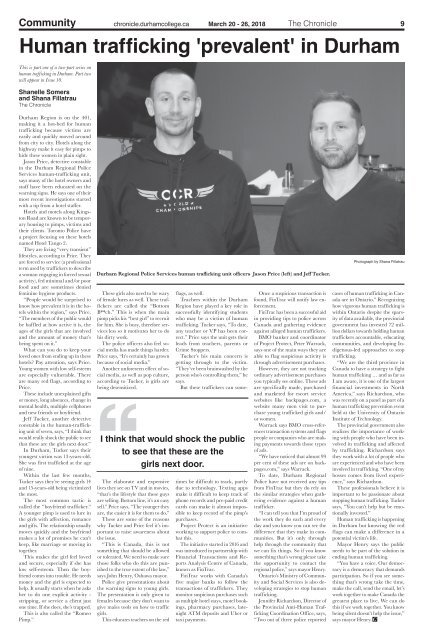You also want an ePaper? Increase the reach of your titles
YUMPU automatically turns print PDFs into web optimized ePapers that Google loves.
Community chronicle.durhamcollege.ca March 20 - 26, 2018 The <strong>Chronicle</strong> 9<br />
Human trafficking 'prevalent' in Durham<br />
This is part one of a two-part series on<br />
human trafficking in Durham. Part two<br />
will appear in <strong>Issue</strong> 10.<br />
Shanelle Somers<br />
and Shana Fillatrau<br />
The <strong>Chronicle</strong><br />
Durham Region is on the 401,<br />
making it a hot-bed for human<br />
trafficking because victims are<br />
easily and quickly moved around<br />
from city to city. Hotels along the<br />
highway make it easy for pimps to<br />
hide these women in plain sight.<br />
Jason Price, detective constable<br />
in the Durham Regional Police<br />
Services human-trafficking unit,<br />
says many of the hotel owners and<br />
staff have been educated on the<br />
warning signs. He says one of their<br />
most recent investigations started<br />
with a tip from a hotel staffer.<br />
Hotels and motels along Kingston<br />
Road are known to be temporary<br />
housing to pimps, victims and<br />
their clients. Toronto Police have<br />
a project focusing on these hotels<br />
named Hotel Tango 2.<br />
They are living “very transient”<br />
lifestyles, according to Price. They<br />
are forced to service (a professional<br />
term used by traffickers to describe<br />
a woman engaging in forced sexual<br />
activity), fed minimal and/or poor<br />
food and are sometimes denied<br />
feminine hygiene products.<br />
“People would be surprised to<br />
know how prevalent it is in the hotels<br />
within the region,” says Price.<br />
“The members of the public would<br />
be baffled at how active it is, the<br />
ages of the girls that are involved<br />
and the amount of money that’s<br />
being spent on it.”<br />
What can you do to keep your<br />
loved ones from ending up in these<br />
hotels? Pay attention, says Price.<br />
Young women with low self-esteem<br />
are especi<strong>all</strong>y vulnerable. There<br />
are many red flags, according to<br />
Price.<br />
These include unexplained gifts<br />
or money, long absences, change in<br />
mental health, multiple cellphones<br />
and new friends or boyfriend.<br />
Jeff Tucker, another detective<br />
constable in the human-trafficking<br />
unit of seven, says, “I think that<br />
would re<strong>all</strong>y shock the public to see<br />
that these are the girls next door.”<br />
In Durham, Tucker says their<br />
youngest victim was 13-years-old.<br />
She was first trafficked at the age<br />
of nine.<br />
Within the last few months,<br />
Tucker says they’re seeing girls 14<br />
and 15-years-old being victimized<br />
the most.<br />
The most common tactic is<br />
c<strong>all</strong>ed the “boyfriend trafficker.”<br />
A younger pimp is used to lure in<br />
the girls with affection, romance<br />
and gifts. The relationship usu<strong>all</strong>y<br />
moves quickly and the boyfriend<br />
makes a lot of promises he can’t<br />
keep, like marriage or moving in<br />
together.<br />
This makes the girl feel loved<br />
and secure, especi<strong>all</strong>y if she has<br />
low self-esteem. Then the boyfriend<br />
comes into trouble. He needs<br />
money and the girl is expected to<br />
help. It usu<strong>all</strong>y starts when he asks<br />
her to do one explicit activity -<br />
stripping, or service a client just<br />
one time. If she does, she’s trapped.<br />
This is also c<strong>all</strong>ed the “Romeo<br />
Pimp.”<br />
Durham Regional Police Services human trafficking unit officers Jason Price (left) and Jeff Tucker.<br />
These girls also need to be wary<br />
of female lures as well. These traffickers<br />
are c<strong>all</strong>ed the “Bottom<br />
B**ch.” This is when the main<br />
pimp picks his “best girl” to recruit<br />
for him. She is busy, therefore services<br />
less so it motivates her to do<br />
his dirty work.<br />
The police officers also feel social<br />
media has made things harder.<br />
Price says, “It’s certainly has grown<br />
because of social media.”<br />
Another unforeseen effect of social<br />
media, as well as pop culture,<br />
according to Tucker, is girls are<br />
being desensitized.<br />
The elaborate and expensive<br />
lives they see on TV and in movies,<br />
“that’s the lifestyle that these guys<br />
are selling. Bottom line, it’s an easy<br />
sell.” Price says, “The younger they<br />
are, the easier it is for them to do.”<br />
These are some of the reasons<br />
why Tucker and Price feel it’s important<br />
to raise awareness about<br />
the issue.<br />
“This is Canada, this is not<br />
something that should be <strong>all</strong>owed<br />
or tolerated. We need to make sure<br />
those folks who do this are punished<br />
to the true extent of the law,”<br />
says John Henry, Oshawa mayor.<br />
Police give presentations about<br />
the warning signs to young girls.<br />
The presentation is only given to<br />
females because they don’t want to<br />
give males tools on how to traffic<br />
girls.<br />
This educates teachers on the red<br />
I think that would shock the public<br />
to see that these are the<br />
girls next door.<br />
flags, as well.<br />
Teachers within the Durham<br />
Region have played a key role in<br />
successfully identifying students<br />
who may be a victim of human<br />
trafficking. Tucker says, “To date,<br />
any teacher or VP has been correct.”<br />
Price says the unit gets their<br />
leads from teachers, parents or<br />
Crime Stoppers.<br />
Tucker’s his main concern is<br />
getting through to the victim.<br />
“They’ve been brainwashed by the<br />
person who’s controlling them,” he<br />
says.<br />
But these traffickers can sometimes<br />
be difficult to track, partly<br />
due to technology. Texting apps<br />
make it difficult to keep track of<br />
phone records and pre-paid credit<br />
cards can make it almost impossible<br />
to keep record of the pimp’s<br />
purchases.<br />
Project Protect is an initiative<br />
working to support police to combat<br />
this.<br />
The initiative started in 2016 and<br />
was introduced in partnership with<br />
Financial Transactions and Reports<br />
Analysis Centre of Canada,<br />
known as FinTrac.<br />
FinTrac works with Canada’s<br />
five major banks to follow the<br />
transactions of traffickers. They<br />
monitor suspicious purchases such<br />
as multiple hotel stays, motel bookings,<br />
pharmacy purchases, latenight<br />
ATM deposits and Uber or<br />
taxi payments.<br />
Once a suspicious transaction is<br />
found, FinTrac will notify law enforcement.<br />
FinTrac has been a successful aid<br />
in providing tips to police across<br />
Canada and gathering evidence<br />
against <strong>all</strong>eged human traffickers.<br />
BMO banker and coordinator<br />
of Project Protect, Peter Warrack,<br />
says one of the main ways they are<br />
able to flag suspicious activity is<br />
through advertisement purchases.<br />
However, they are not tracking<br />
ordinary advertisement purchases<br />
you typic<strong>all</strong>y see online. These ads<br />
are specific<strong>all</strong>y made, purchased<br />
and marketed for escort service<br />
websites like back<strong>pages</strong>.com, a<br />
website many men visit to purchase<br />
young trafficked girls and/<br />
or women.<br />
Warrack says BMO cross-references<br />
transaction systems and flags<br />
people or companies who are making<br />
payments towards those types<br />
of ads.<br />
“We have noticed that almost 99<br />
per cent of these ads are on back<strong>pages</strong>.com,”<br />
says Warrack.<br />
To date, Durham Regional<br />
Police have not received any tips<br />
from FinTrac but they do rely on<br />
the similar strategies when gathering<br />
evidence against a human<br />
trafficker.<br />
“I can tell you that I’m proud of<br />
the work they do each and every<br />
day and you know you can see the<br />
difference that they make in communities.<br />
But it’s only through<br />
help through the community that<br />
we can fix things. So if you know<br />
something that’s wrong please take<br />
the opportunity to contact the<br />
regional police,” says mayor Henry.<br />
Ontario’s Ministry of Community<br />
and Social Services is also developing<br />
strategies to stop human<br />
trafficking.<br />
Jennifer Richardson, Director of<br />
the Provincial Anti-Human Trafficking<br />
Coordination Office, says,<br />
“Two out of three police reported<br />
Photograph by Shana Fillatrau<br />
cases of human trafficking in Canada<br />
are in Ontario.” Recognizing<br />
how vigorous human trafficking is<br />
within Ontario despite the sparsity<br />
of data available, the provincial<br />
government has invested 72 million<br />
dollars towards holding human<br />
traffickers accountable, educating<br />
communities, and developing Indigenous-led<br />
approaches to stop<br />
trafficking.<br />
“We are the third province in<br />
Canada to have a strategy to fight<br />
human trafficking … and as far as<br />
I am aware, it is one of the largest<br />
financial investments in North<br />
America,” says Richardson, who<br />
was recently on a panel as part of a<br />
human trafficking prevention event<br />
held at the University of Ontario<br />
Institute of Technology.<br />
The provincial government also<br />
realizes the importance of working<br />
with people who have been involved<br />
in trafficking and affected<br />
by trafficking. Richardson says<br />
they work with a lot of people who<br />
are experienced and who have been<br />
involved in trafficking. “One of my<br />
bosses comes from lived experience,”<br />
says Richardson.<br />
These professionals believe it is<br />
important to be passionate about<br />
stopping human trafficking. Tucker<br />
says, “You can’t help but be emotion<strong>all</strong>y<br />
invested.”<br />
Human trafficking is happening<br />
in Durham but knowing the red<br />
flags can make a difference in a<br />
potential victim’s life.<br />
Mayor Henry says the public<br />
needs to be part of the solution in<br />
ending human trafficking.<br />
“You have a voice. Our democracy<br />
is a democracy that demands<br />
participation. So if you see something<br />
that’s wrong take the time,<br />
make the c<strong>all</strong>, send the email, let’s<br />
work together to make Canada the<br />
greatest place to live. We can do<br />
this if we work together. You know<br />
being silent doesn’t help the issue,”<br />
says mayor Henry.


















